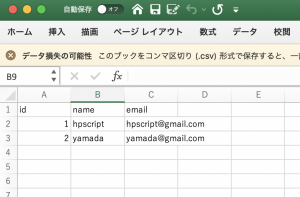1.fopenして、fputcsvで作成する手法。
public function csv(){
$ary = [
["山田", "12", "O",""],
["田中", "20", "A",""],
["吉田", "18", "AB",""],
["伊藤", "19", "B", "エンジニア"]
];
foreach($ary as $key => $value){
array_splice($ary[$key], 1, 0, "");
}
$column = ["名前", "無記入", "年齢", "血液型", "備考"];
array_unshift($ary, $column);
$filename = "hogehoge.csv";
$f = fopen($filename, "w");
stream_filter_prepend($f,'convert.iconv.utf-8/cp932');
if($f) {
foreach($ary as $line){
fputcsv($f, $line);
}
}
header('Content-Type: application/octet-stream');
header('Content-Length: '.filesize($filename));
header('Content-Disposition: attachment; filename=hogehoge.csv');
readfile($filename);
}
2. StreamedResponseを使う書き方
public function csv(){
$data = User::all();
$response = new StreamedResponse(function() use($data){
$stream = fopen('php://output', 'w');
stream_filter_prepend($stream, 'convert.iconv.utf-8/cp932//TRANSLIT');
fputcsv($stream, ['id','name','email',]);
foreach($data as $user){
fputcsv($stream, [$user['id'],$user['name'],$user['email'],]);
}
fclose($stream);
});
$response->headers->set('Content-Type', 'application/octet-stream');
$response->headers->set('Content-Disposition', 'attachment; filename="user.csv"');
return $response;
}
やってることは一緒なんだけど、StreamedResponseの方が良い。

